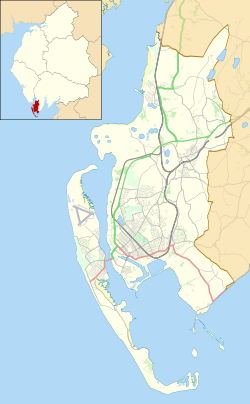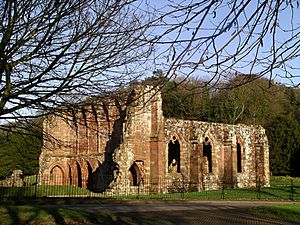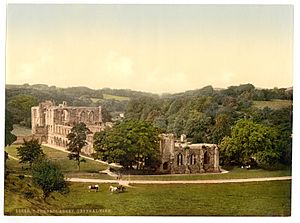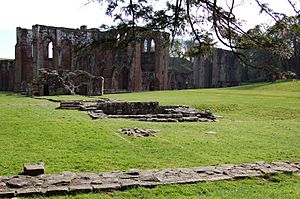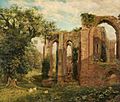Furness Abbey facts for kids
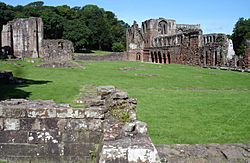
The abbey in August 2007
|
|
| Monastery information | |
|---|---|
| Other names | St. Mary of Furness |
| Order | Cistercian |
| Established | 1123 |
| Disestablished | 1537 |
| Mother house | Congregation of Savigny |
| Controlled churches |
|
| People | |
| Founder(s) | Stephen, Count of Blois |
| Site | |
| Location | The Vale of Nightshade, Newbarns, Barrow-in-Furness, Cumbria, England |
| Coordinates | 54°8′7″N 3°11′52″W / 54.13528°N 3.19778°W |
| Public access | Yes (English Heritage) |
Furness Abbey, also known as St. Mary of Furness, is an old monastery found north of Barrow-in-Furness, Cumbria, England. It was built in 1123. Before it closed, it was the second richest and most powerful Cistercian monastery in England, after Fountains Abbey. This happened during a time called the English Reformation. Today, the abbey has many parts that are protected as Grade I Listed Buildings and a Scheduled Monument. This means they are very important historical sites.
Contents
History of Furness Abbey
How Furness Abbey Began
Stephen, Count of Boulogne, who later became King of England, started Furness Abbey in 1123. It was first built for a group of monks called the Order of Savigny. The abbey is in a place known as the 'Vale of Nightshade', near Dalton-in-Furness. All of its buildings were made from local sandstone.
In 1147, the abbey became home to the Cistercian monks. They slowly made the church bigger and rebuilt it. Most of the ruins you see today are from the 12th and 13th centuries. By the 1400s, the abbey was completely changed. It became one of the biggest and most powerful Cistercian abbeys in England. The Gothic-style buildings were very tall, reaching about 40 meters (131 feet) high.
The Monks' Influence and Power
The monks of Furness Abbey owned a lot of land. They were very powerful in this part of England, which was a remote border area. They had a big influence on the Isle of Man. Some kings and bishops from the Isle of Man were even buried at the abbey.
The monks also owned mines on the island. To control trade between the Furness area and the Isle of Man, they built Piel Castle. This castle helped them protect their goods.
Sometimes, the monks found themselves caught between the fighting Scots and English. In 1322, when Robert the Bruce invaded England, the abbot paid him to stay at the abbey. This helped protect the abbey's wealth and power.
The End of the Abbey
Furness Abbey was closed down and destroyed in 1537. This happened during the English Reformation, under the orders of King Henry VIII. The king wanted to take control of the monasteries' wealth and power.
Furness Abbey Today
Today, Furness Abbey is a beautiful ruin and a popular place for visitors. It is part of the Cistercian Way, an old walking path that used to connect the abbey with Dalton-in-Furness.
Many famous people have visited the abbey. The poet William Wordsworth wrote about it in his poem The Prelude. The artist J. M. W. Turner also drew many pictures of the abbey. Even Queen Victoria visited in 1848.
A young Theodore Roosevelt, who later became a U.S. President, visited with his family in 1869. They played among the ruins, which were not roped off back then. In 1896, a Chinese leader named Li Hongzhang also visited the abbey.
Protecting the Abbey
The Furness Abbey site is a Scheduled Monument and a Conservation Area. It has five Grade I listed buildings. This means they are very important and protected. Between 2008 and 2017, work was done to restore parts of the abbey. This was because some parts were at risk of falling down.
Ghosts and Legends
Many people believe Furness Abbey is haunted! There are stories of at least three ghosts seen there. One is a monk who has been seen climbing stairs and vanishing into a wall.
Another ghost is said to be a squire's daughter. She used to meet her secret love at the abbey after it was ruined. One day, her partner went to sea and never came back. She kept returning to the abbey every day until she died. The path she walked is still called "My Lady's Walk."
There are also many sightings of a "white lady." People are not sure if she is the same as the squire's daughter or a different ghost. Perhaps the most famous ghost is a headless monk on horseback. He is said to ride under a sandstone arch near the Abbey Tavern. His death is linked to a Scottish invasion in 1316.
Some legends say there is a secret tunnel under the abbey. It is believed to connect to Piel Castle and Dalton Castle. This tunnel might have been used by the monks to get supplies or watch the area. There are also rumors that the Holy Grail and King John's missing jewels are hidden somewhere inside a 'Ley tunnel' near the abbey.
Plays at the Abbey
Furness Abbey has been a stage for many large mystery plays. These plays tell stories from the Bible. The first ones were performed in 1958. They continued through the 1960s, but it became hard to find enough people to act in them. The last big performances were in 1988. Prince Edward has even attended one of these plays.
Visiting Furness Abbey
Furness Abbey is located near Manor Road, close to Barrow's main road, Abbey Road. This road is actually named after the abbey! The abbey is also next to the Furness Line railway. There used to be a train station right at Furness Abbey, but it closed in 1950. The closest stations now are Roose and Dalton.
English Heritage runs a small visitor center at Furness Abbey. It has old stone carvings and a gift shop. The abbey and visitor center are open to the public every day. English Heritage members and local residents can visit for free.
Gallery
-
Painting of the abbey by Edward Dayes
-
Furness Abbey by Henry Fox Talbot, circa 1850s
Images for kids
See also
 In Spanish: Abadía de Furness para niños
In Spanish: Abadía de Furness para niños
 | Jessica Watkins |
 | Robert Henry Lawrence Jr. |
 | Mae Jemison |
 | Sian Proctor |
 | Guion Bluford |


